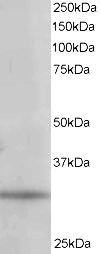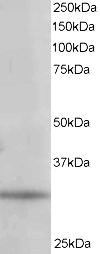Goat Anti-PITPN / PITP alpha Antibody
Peptide-affinity purified goat antibody
- SPECIFICATION
- CITATIONS
- PROTOCOLS
- BACKGROUND

Application
| WB, Pep-ELISA |
|---|---|
| Primary Accession | Q00169 |
| Other Accession | NP_006215, 5306, 18738 (mouse), 29525 (rat) |
| Reactivity | Human |
| Predicted | Mouse, Rat, Dog |
| Host | Goat |
| Clonality | Polyclonal |
| Concentration | 100ug/200ul |
| Isotype | IgG |
| Calculated MW | 31806 Da |
| Gene ID | 5306 |
|---|---|
| Other Names | Phosphatidylinositol transfer protein alpha isoform, PI-TP-alpha, PtdIns transfer protein alpha, PtdInsTP alpha, PITPNA, PITPN |
| Format | 0.5 mg IgG/ml in Tris saline (20mM Tris pH7.3, 150mM NaCl), 0.02% sodium azide, with 0.5% bovine serum albumin |
| Storage | Maintain refrigerated at 2-8°C for up to 6 months. For long term storage store at -20°C in small aliquots to prevent freeze-thaw cycles. |
| Precautions | Goat Anti-PITPN / PITP alpha Antibody is for research use only and not for use in diagnostic or therapeutic procedures. |
| Name | PITPNA |
|---|---|
| Synonyms | PITPN |
| Function | Catalyzes the transfer of phosphatidylinositol (PI) and phosphatidylcholine (PC) between membranes (PubMed:10531358, PubMed:14962392, PubMed:15522822, PubMed:18636990, PubMed:22822086). Shows a preference for PI and PC containing shorter saturated or monosaturated acyl chains at the sn-1 and sn-2 positions (PubMed:15522822, PubMed:22822086). Preference order for PC is C16:1 > C16:0 > C18:1 > C18:0 > C20:4 and for PI is C16:1 > C16:0 > C18:1 > C18:0 > C20:4 > C20:3 (PubMed:22822086). |
| Cellular Location | Cytoplasm {ECO:0000250|UniProtKB:P53810}. Nucleus {ECO:0000250|UniProtKB:P53810} |

Thousands of laboratories across the world have published research that depended on the performance of antibodies from Abcepta to advance their research. Check out links to articles that cite our products in major peer-reviewed journals, organized by research category.
info@abcepta.com, and receive a free "I Love Antibodies" mug.
Provided below are standard protocols that you may find useful for product applications.
Background
This gene encodes a member of a family of lipid-binding proteins that transfer molecules of phosphatidylinositol or phosphatidylcholine between membrane surfaces. The protein is implicated in phospholipase C signaling and in the production of phosphatidylinositol 3,4,5-trisphosphate (PIP3) by phosphoinositide-3-kinase.
References
Proteome analysis of the thalamus and cerebrospinal fluid reveals glycolysis dysfunction and potential biomarkers candidates for schizophrenia. Martins-de-Souza D, et al. J Psychiatr Res, 2010 May 14. PMID 20471030.
Toward a confocal subcellular atlas of the human proteome. Barbe L, et al. Mol Cell Proteomics, 2008 Mar. PMID 18029348.
Violating the splicing rules: TG dinucleotides function as alternative 3' splice sites in U2-dependent introns. Szafranski K, et al. Genome Biol, 2007. PMID 17672918.
Large-scale mapping of human protein-protein interactions by mass spectrometry. Ewing RM, et al. Mol Syst Biol, 2007. PMID 17353931.
Phosphatidylinositol transfer protein-alpha in netrin-1-induced PLC signalling and neurite outgrowth. Xie Y, et al. Nat Cell Biol, 2005 Nov. PMID 16244667.
If you have used an Abcepta product and would like to share how it has performed, please click on the "Submit Review" button and provide the requested information. Our staff will examine and post your review and contact you if needed.
If you have any additional inquiries please email technical services at tech@abcepta.com.













 Foundational characteristics of cancer include proliferation, angiogenesis, migration, evasion of apoptosis, and cellular immortality. Find key markers for these cellular processes and antibodies to detect them.
Foundational characteristics of cancer include proliferation, angiogenesis, migration, evasion of apoptosis, and cellular immortality. Find key markers for these cellular processes and antibodies to detect them. The SUMOplot™ Analysis Program predicts and scores sumoylation sites in your protein. SUMOylation is a post-translational modification involved in various cellular processes, such as nuclear-cytosolic transport, transcriptional regulation, apoptosis, protein stability, response to stress, and progression through the cell cycle.
The SUMOplot™ Analysis Program predicts and scores sumoylation sites in your protein. SUMOylation is a post-translational modification involved in various cellular processes, such as nuclear-cytosolic transport, transcriptional regulation, apoptosis, protein stability, response to stress, and progression through the cell cycle. The Autophagy Receptor Motif Plotter predicts and scores autophagy receptor binding sites in your protein. Identifying proteins connected to this pathway is critical to understanding the role of autophagy in physiological as well as pathological processes such as development, differentiation, neurodegenerative diseases, stress, infection, and cancer.
The Autophagy Receptor Motif Plotter predicts and scores autophagy receptor binding sites in your protein. Identifying proteins connected to this pathway is critical to understanding the role of autophagy in physiological as well as pathological processes such as development, differentiation, neurodegenerative diseases, stress, infection, and cancer.



